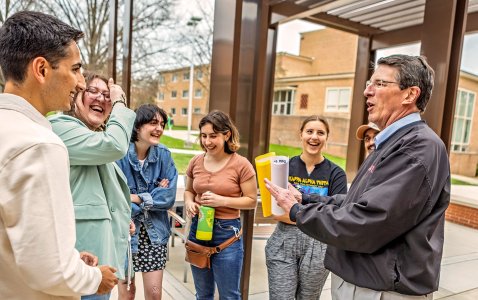Leader’s Letter

As I write this essay, students have returned from spring break and for the first time in two years everyone is on campus, with no restriction to activities, and without the need to wear facial coverings and keep a distance from one another. The energy is palpable as we enter the final weeks of an academic year, complete with lectures, concerts, productions, art shows, athletic competition, celebrations of student scholarship and accomplishment, and ultimately, preparation for Commencement.
It is an especially good time to be on campus.
The students who will graduate this spring spent more than half of their time at OWU in the grips of a global pandemic. They watched and actively participated in our nation’s reckoning with racial injustice, deep political divisions, economic uncertainty, and most recently, the atrocities being inflicted on the people of Ukraine by Vladimir Putin. When they graduate, they will enter a world riddled with deep, complex problems.
An OWU education prepares students for a world where puzzles invariably run up against mysteries that are filled with ambiguity.
President, Ohio Wesleyan University
As I think about the world our graduates will enter, I find myself thinking anew about the importance of liberal education. I have been thinking about this in relation to a piece written by Gregory Treverton in the June 2007 issue of Smithsonian Magazine.
Treverton discussed the differences between puzzles and mysteries. About puzzles, Treverton wrote, “even when you can’t find the right answer, you know it exists. Puzzles can be solved; they have answers.” About mysteries, he wrote, “a mystery offers no such comfort. It poses a question that has no definitive answer because the answer is contingent; it depends on a future interaction of many factors, known and unknown. … A mystery is an attempt to define ambiguities.”
Might we say that a critical outcome of liberal education is the ability to do the hard work that identifies the acts that solve puzzles, to acknowledge the mysteries for which there are no definitive answers, to be able to discern the difference between a puzzle and a mystery, and to adequately value the role of each in human endeavor?
An OWU education prepares students for a world where puzzles invariably run up against mysteries that are filled with ambiguity. In this context, these new graduates will be prepared to apply the skills of critical and analytical thinking, interdisciplinary approaches to complex problems, intellectual curiosity, social awareness, political engagement, and an empathy that solicits and listens to those with different ideas and different life experiences.
The pandemic has been a lesson in puzzles and mysteries. On campus, as in every organization in the country, the past two years have required us to make decisions at lightning speed, often with only a fraction of the information we would have liked. We sought to align our decisions with our mission and values. We benefited from the wise counsel of a Board chair who has spent much of his professional life thinking about pandemics, and from the deep support of local public health officials and physicians within the OhioHealth network. We benefited from the flexibility, resilience, and sheer determination of faculty, staff, and students.
As we, hopefully, now are emerging from the grips of the pandemic, we can look back and ask what we learned.
While there is much we learned, I think the most important lesson is the renewed reminder of the advantage of being able to apply the lessons of liberal education in the midst of an unexpected crisis and an unprecedented challenge. We were both solving problems and acknowledging mysteries, finding clear answers and recognizing deep ambiguity.
In this issue of OWU Magazine, we share stories of the impact of our alumni in a particular region, greater Cleveland, and we hear from alumni who work in the field of mental health. In both stories, we see the work of alumni who have both solved puzzles and learned to live with mysteries. These stories remind us that OWU graduates are prepared to face complex and unforeseen challenges—like the mental health challenges exacerbated by the COVID pandemic, like the challenges of reinvigorating our great urban centers—and they are making the most of great new opportunities created in a richly diverse nation.
I share all of this to affirm again the fundamental importance of liberal education to the well-being of our society, the future of our planet, and the full flourishing of human potential.
Liberal education is not about acquiring the skills for a trade. It is about developing the habits of the mind, and the heart, that spark imagination and, ultimately, help resolve problems.
Sometimes, the resolution includes clear answers. At other times, the resolution finds a way to live in the midst of the unknown. It is both science and art.
I am grateful to be in a place so deeply grounded in this mission, and I am grateful for the support you provide to make this real. As a result, I can say with confidence, members of the Class of 2022 are ready for the world that awaits them.

Rock Jones
President, Ohio Wesleyan University
Twitter: @owu_rockjones
